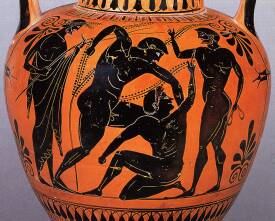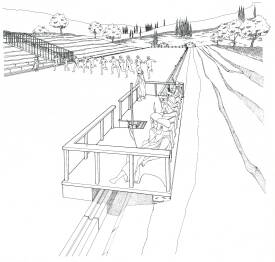| Olympia | Games | Events & athletes | Background | Impact |
At some games, e.g. the Olympic and the Nemean games, the organizers were called 'hellanodikai', which means 'judges of the Greeks'. This name refers to the rule that all participants had to be Greeks, and is first attested around the time of the Persian wars, when the Greeks joined for the first time to fight a common enemy. The hellanodikai were at the same time organizers and judges of the games.
The function is best known from Olympia. Originally the local king was the only organizer. Later a board of hellanodikai were appointed by lot from the leading families of Elis. From the fourth century onwards, it consisted of ten men, who received ten months of training. ![]()
 The hellanodikai had various tasks. First of all they decided on the admission of the athletes. Participants had to be free Greek citizens, and had to be present one month in advance. Latecomers were disqualified. The admitted athletes were divided into age-categories. In this time without birth-certificates the hellanodikai took their decision on the basis of the physical appearance of the athlete. In the month preceding the games they supervised the training. Athletes had to follow the compulsory training schedules. Before the contest the hellanodikai drew lots to decide which athletes had to contend with each other. During the games they decided the winner. They checked if nobody cheated and punished offences. For this they were assisted by umpires, called stick- or whipbearers, who stood near the athletes and executed the punishments. In case of corruption, the hellanodikai determined the fine.
Against a decision of the hellanodikai athletes could appeal to the Olympic council. The council could not undo the decision, but it could punish the hellanodikai.
The hellanodikai had various tasks. First of all they decided on the admission of the athletes. Participants had to be free Greek citizens, and had to be present one month in advance. Latecomers were disqualified. The admitted athletes were divided into age-categories. In this time without birth-certificates the hellanodikai took their decision on the basis of the physical appearance of the athlete. In the month preceding the games they supervised the training. Athletes had to follow the compulsory training schedules. Before the contest the hellanodikai drew lots to decide which athletes had to contend with each other. During the games they decided the winner. They checked if nobody cheated and punished offences. For this they were assisted by umpires, called stick- or whipbearers, who stood near the athletes and executed the punishments. In case of corruption, the hellanodikai determined the fine.
Against a decision of the hellanodikai athletes could appeal to the Olympic council. The council could not undo the decision, but it could punish the hellanodikai.
 The function of hellanodikes was very honourable, with a sacral component, which is for example present in the purification ritual. The hellanodikai wore a valuable purple robe to express their authority. A seat of honour was provided for them in the stadion. To ensure the honesty of the hellanodikai, they were not allowed to participate in the games.
The function of hellanodikes was very honourable, with a sacral component, which is for example present in the purification ritual. The hellanodikai wore a valuable purple robe to express their authority. A seat of honour was provided for them in the stadion. To ensure the honesty of the hellanodikai, they were not allowed to participate in the games. ![]()